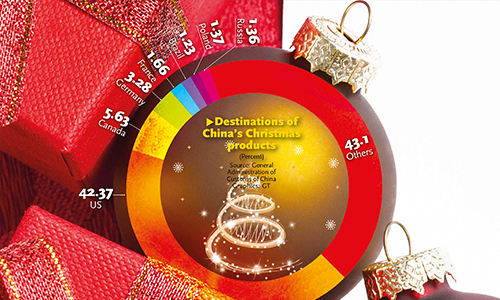Christmas products made by honest hands
Unfounded forced labor claims risk ordinary manufacturing workers’ jobs

Based on a dubious report of so-called forced labor by foreign prisoners making Christmas cards, many foreign media outlets have mounted an attack on China's manufacturing sector, describing workers as "slaves," pressuring foreign companies to cut ties with Chinese factories and even suggesting boycotts of China-made products.
But behind the Christmas card and thousands of other products are not prisoners being forced to work or slaves, but ordinary Chinese workers who rely on those toiling but honest manufacturing jobs to make ends meet, businesses owners and industry insiders told the Global Times on Thursday.
Beyond the insults, what some Western media outlets are doing is risking the jobs of many workers in the Chinese company targeted, they said.
At Zhejiang Yunguang Printing, which is the target of the forced foreign prisoners labor accusations, there are more than 200 workers, 80 percent of whom are local residents. They produced and packaged the Christmas cards, rather than alleged foreign convicts, according to Lu Yunbiao, general manager of Zhejiang Yunguang Printing.
Lu said that much of the production and packaging work is done by robots and most employees operate the machines. More than half of the jobs are technical positions with a minimum monthly wage of 4,500 yuan ($643) that requires up to five years of training, he said.
"It is fundamentally impossible to hire prisoners to participate in production at the factories," Hong Tao, director of the Institute of Business Economics, Beijing Technology and Business University, told the Global Times on Thursday. "It's all just rumors."
But those rumors pushed by many Western media outlets have consequences, as they exert tremendous pressure on foreign companies to sever ties with the Chinese firm.
"This thing has caused so much trouble for our clients and us. It is very annoying," Lu said.
Following widespread media reports about the Christmas card, several foreign companies, including UK-based Tesco, Australia-based Cotton On and US-based Disney, have launched investigations into the Chinese firm based in the manufacturing powerhouse of Zhejiang Province in East China.

Tesco, which has worked with Zhejiang Yunguang for a decade, said an inspection conducted just last month did not produce any evidence for the claims, but it would continue to investigate.
Tesco on Thursday declined to comment further. "We have nothing more to say than what we have already said," a spokesperson told the Global Times.
Disney, which buys picture albums from the Chinese factory, conducted an unannounced inspection on Thursday morning.
Zhejiang Yunguang's operations will be severely damaged if foreign partners cut ties, Lu said.
"If it was just the company that takes some losses, it's ok. But if we let the employees go, it will be a huge loss for them because without working here, they will have gotten no income," he said.
Employees at Zhejiang Yunguang also declined requests for interviews on Thursday, citing company policies.
It is not just Zhejiang Yunguang's employees. Many more manufacturing workers' jobs could also be at risk, as some in the West are pushing the narrative against the company as well as the whole sector that makes Christmas products. There were more than 41.78 million people in China working in such factories as of 2018, according to official data.
However, Hong said that there might be another positive aspect of the politically motivated incident because if evidence shows that the company has not engaged in the accused forced labor practices, it could even be a boost to the company's reputation.
"After clarifying the incident, there could be even more orders," he said, pointing to Chinese telecom firm Huawei, which has been targeted by the US' global crackdown.
"On the one hand, this incident affects the company's market, but on the other hand, it could boost its brand awareness."